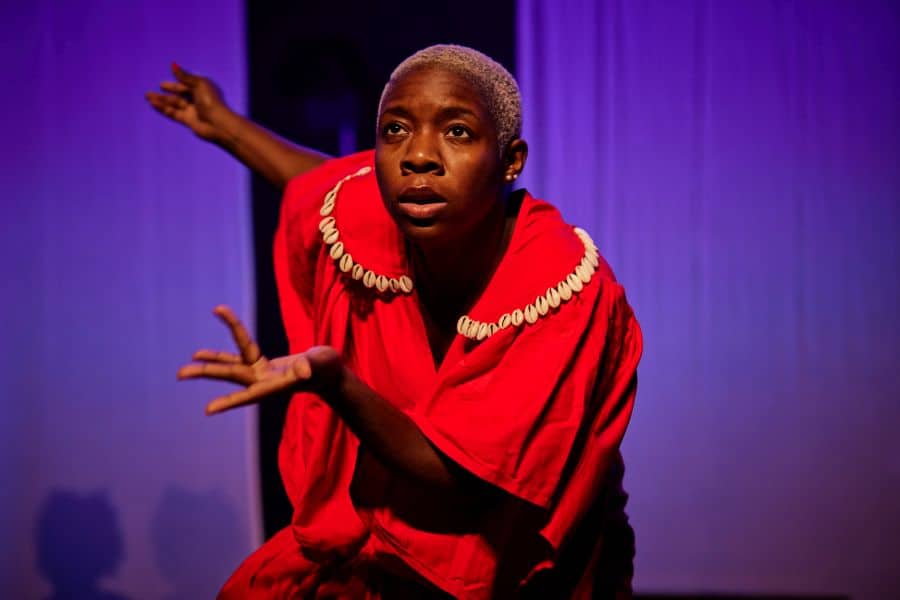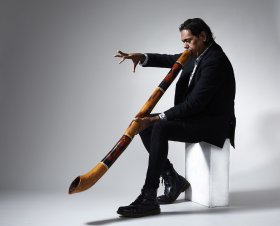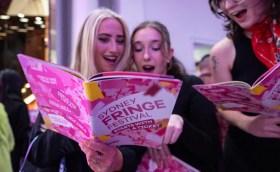Bikutsi 3000 is a performance work by Cameroonian musician Blick Bassy that combines movement, film and pulsating African fusion beats to reimagine parts of that continent’s history since colonisation.
Its narrative places women dancers as powerful leaders of non-violent resistance – turning past and present leanings towards violence and patriarchy on their head. But despite a compelling premise, there are various weak spots within the piece that hold it back from fuller resonance.
The Bikutsi dance is a Cameroonian tradition that flourished in the mid-20th century, and is performed by the Beti women of the region, who use its strong stamping dance in rituals to relieve suffering and loss. The dance is the symbolic lynchpin of Bassy’s work, as we watch the Queen of Nkolmesseng (Cameroon) initiate a 165-year resistance movement that calls on women-only dance armies around the continent to free Mintaba (Africa) from all forms of colonialism by 2050.
Yet from its opening, there is emotional force missing from this valiant revolution. We meet the majestic Queen (played by Olga Mouak) and the work’s narrator (Hermine Yollo) in a series of filmed projections, and this choice of medium seems the main reason the work’s initial scenes lack a heartbeat and human pulse. It is only when its four dancer-performers step onto the stage in person that any real connections to their resounding political journey feels possible.
That said, the show’s opening on-screen sequences provide crucial historical background to the story (though the timing of those scenes makes it hard to absorb its details).
The Berlin Conference of 1885 is one of the narrative’s starting points – marking the moment when countries like Germany, Portugal, France and Britain convened to decide who would get which slices of the African continent – consolidating their imperial controls and ending many self-governing African states.
These colonial injustices spur the Queen of Nkolmesseng to summon dance armies across Mintaba to defy the oppressive invaders and allow freer, fairer societies to remerge. Her vision fills us with determination that women and dance can be key engines of change in realising a better future.
As we meet Bikutsi 3000’s four lead performers – Nadia ‘Nadeeya’ Gabrieli Kalati, Audrey Carlita Minko, Mwendwa Marchand and Martine Mbock – their Afro-pop inspired moves remind us of the enduring strength of their cultural traditions and the important role women play as custodians of them.
Choreographer and dancer Kalati brings an especially enlivening presence to the stage with her solo sequence embodying Tagne, the leader of Nkolmesseng’s dance army. Soon after, Mbock is also strong as the leader of the Okahandja (Namibia) dance battalion. But these solos, and even the work’s larger ensemble sequences, cannot embody Blassy’s imagined dance armies in scale or substance. The work’s cast of four main onstage performers (a cast size that could be due to budget limitations) is another reason it doesn’t pack the full-bodied punch its story deserves.
Read: Theatre review: Happy Meal, Perth Festival
Blassy’s musical score is undoubtedly electric and helps bring the room alive as the dancers charge the stage with their own high-octane power. But as a fully integrated work that melds its elements together to explore its stirring themes – it falls short of achieving a cohesive whole.
Theatre has rich traditions of combining film, text, movement and music for powerful effect (and it’s arguably an on-trend choice within the zeitgeist). While some parts of Bikutsi 3000 conjure high-impact connections through a combination of these mediums, there are too many other parts that do not adequately resolve its poetic and political meanings.
Bikutsi 3000 by Blick Bassy
State Theatre Centre of WA
Presented by Perth Festival
Bikutsi 3000 will be performed until 14 February 2023.






